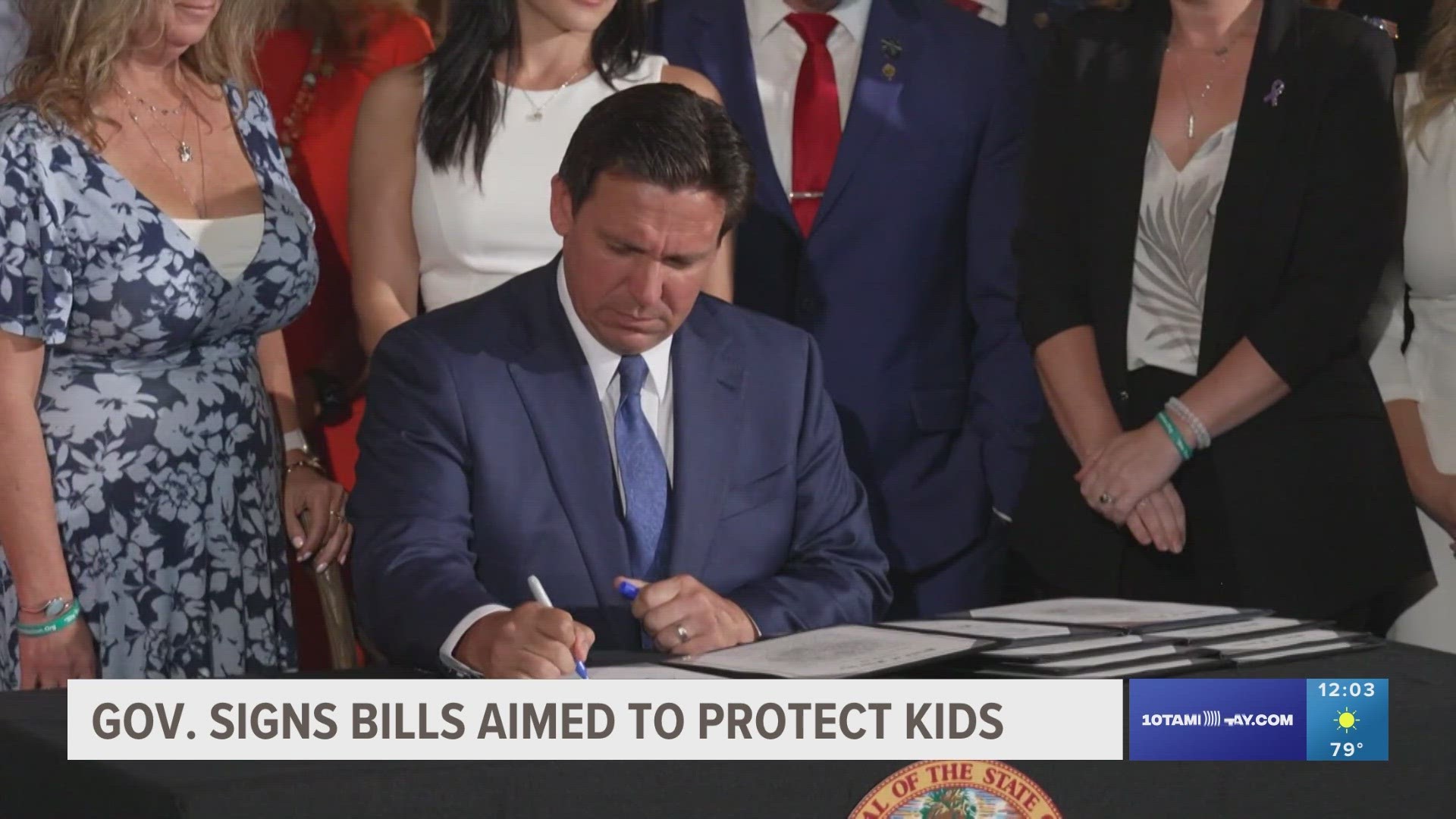ST. PETERSBURG, Fla. — Gov. Ron DeSantis signed a handful of bills aimed at keeping kids safe from sexual predators.
During a news conference Wednesday at The Urban Stillhouse in St. Pete, the governor gave final approval to five bills. Here's what each of them do:
HB 1545: Child Exploitation Offenses
This bill specifically cracks down on the "grooming" of minors that happens online, DeSantis said.
It increases the penalties for child exploitation charges and creates a new offense of "Harmful Communication to a Minor" within Florida's criminal code.
If convicted of the crime, prosecutors would have to prove that the suspect engaged in a "pattern of communication to a minor that includes explicit and detailed" descriptions of sexual activity or "excitement."
"The fact of the matter is with the rise of the internet and social media and all these different apps that has been a playground for these predators to go in and groom these young kids," the governor said. "This whole online stuff is a major, major cesspool and even the most diligent parent is not gonna be able to do it alone."
The mother of a 7-year-old girl who was abducted and murdered by a man who had been facing child pornography charges spoke at the event.
“There is no fixing it. It sees no color, it sees no creed, it sees nothing. It has nothing to do with your religion, whether you’re a good parent, a bad parent,” Diena Thompson said.
Her daughter, Somer Thompson, was lured into a stranger's home while walking home from school on Oct. 19, 2009, in a suburb near Jacksonville. Her body was found in a Georgia landfill two days later.
This bill goes into effect on Oct. 1.
HB 1131: Online Sting Operations Grant Program
To add another layer of protection against predators, HB 1131 creates a program within the Florida Department of Law Enforcement that allows local agencies to facilitate "sting operations."
DeSantis compared the operations to the NBC reality television show "To Catch a Predator" where adults posing as children talk to sexual predators online. The group worked with law enforcement to arrest adults who showed up at a staged home with the intent of having sex with a minor.
This bill goes into effect on July 1.
HB 1235: Sexual Predators and Sexual Offenders
Under this legislation, convicted sex offenders will face stricter requirements on registering and reporting their status.
The governor said the bill closes a loophole that allowed sex offenders to avoid reporting their address if it's a temporary residence separate from their main residence.
"The whole purpose of the registry is to alert other people about who may be in their communities or in their neighborhoods," DeSantis said. "And the reason why you do that is because folks who have committed these types of offenses typically re-offend, and there's a high likelihood that that could happen so we want people to be on notice."
It also requires a person to register their car or vessel if that's where they primarily live and adds extra reporting provisions for international travel.
This bill goes into effect on Oct. 1.
SB 1224: Protection of Children and Victims of Crime
This bill gets Florida's Statewide Guardian ad Litem Office more involved in helping kids who are aging out of the foster care system. DeSantis said it will help those 18-year-olds with educational and working opportunities.
Another focus of the bill applies to how law enforcement responds to domestic violence incidents. It adds training requirements to fully flesh out whether a victim is potentially at a higher risk of getting hurt or killed in the near future once the responding officers leave.
Members from the Gabby Petito Foundation and her family were at the press conference to support the bill signing.
"The bill was inspired by Gabby Petitio who of course was tragically murdered by her own fiance," DeSantis said. "Gabby's father Joe has been supporting and pushing for the language in the legislation as well as other members of the family and the foundation. today we honor those efforts by making this the law of the land in the state of Florida."
This bill goes into effect on July 1.
HB 305: Offenses Involving Children
Out-of-court statements made by any victim of abuse who is a minor are admissible in court under this bill. Previously, the court would only accept out-of-court statements made by abuse victims who are 16 years old or younger.
Leaders said this kind of evidence should be allowed to go before a jury because children who are abused may not feel comfortable making statements within a courtroom, or may have a harder time recounting the abuse under such stressful circumstances. DeSantis said the things victims share in the immediate aftermath of the abuse – before ever entering a courtroom – should be given proper consideration.
This bill goes into effect on July 1.

